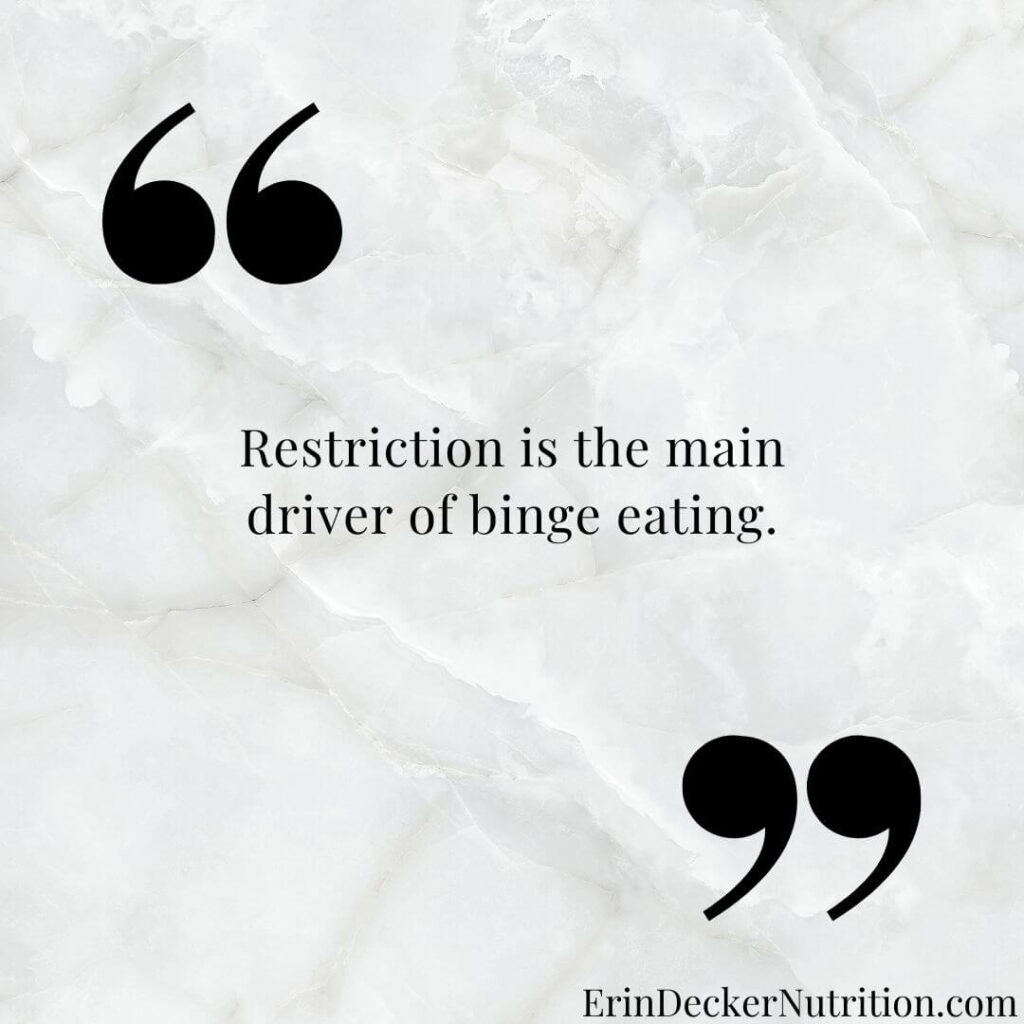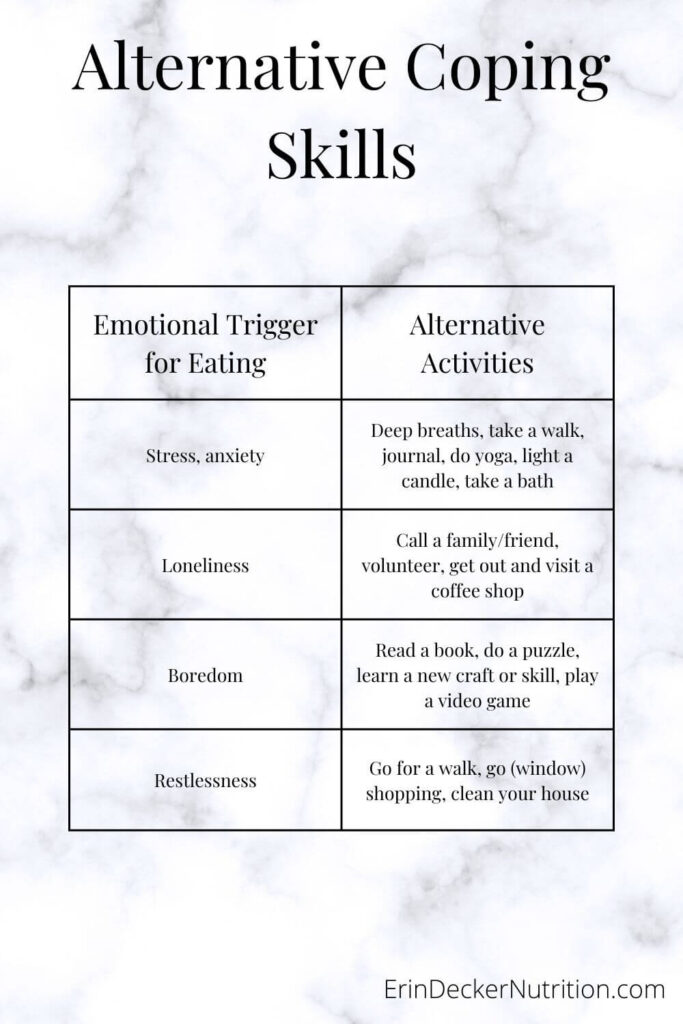I often have clients come to me saying that they can’t stop eating. Oftentimes, they blame it on themselves and their lack of willpower.
While willpower can sometimes help break the trance, it is rarely a lasting solution. Our willpower wanes throughout the day so of course if you’ve had a particularly long or stressful day, there won’t be enough left in the tank to stop the cycle of overeating.
So what do you do when you can’t stop eating if you can’t rely on willpower? First, it’s helpful to consider reasons why you can’t stop eating.
Table of Contents
Reasons you can’t stop eating
You might find it hard to stop eating for a few different reasons.
In most cases, restriction is the main driver of binge eating or general overeating. So, if you go a long time without eating, it is totally normal to overdo it at the next meal. It’s simply your body’s way of getting the fuel you need.
This isn’t necessarily a bad thing! Hitting the extremes of hunger and fullness are a normal part of life and help you reconnect with your hunger cues.

However, if you find it is happening more and more often, it can cause mental and emotional distress, not to mention physical health problems.
See below for reasons you can’t stop eating.
Binge Eating Disorder
Binge eating disorder (BED) is a condition in which someone eats a large amount of food in a short period of time. It is diagnosed by a mental health professional. BED could be a reason you can’t stop eating.
That being said, not everyone who experiences binge eating has binge eating disorder. See below for some other explanations.
Hunger
As described above, hunger is one of the main drivers of eating. If you allow yourself to get too hungry, it makes sense that you might feel out of control around food. This is your body’s natural drive to find food to keep you fed and safe.
If you find yourself hungry all the time, you could be dealing with extreme hunger. This is a natural response to periods of restriction, such as a diet or restrictive eating disorder. This can last for as little as days or up to months at a time.
Boredom
Eating when bored is common because it changes our mental state and gives us something to do. This is especially true if you are in a state of restriction (e.g. a diet!) Eating spikes feel-good hormones when you’re undernourished, leading you to feel like you’re addicted to food.
Stress and anxiety
Stress and anxiety cause some people to feel fidgety and unable to relax. Eating gives your hands something to do.
Eating also changes your internal state, giving the impression that the stress has been relieved. As described above, this is especially true if you are only allowing yourself intermittent access to “forbidden foods”, if at all! This will trigger the release of feel-good hormones and neurotransmitters.
Depression
Depression can affect appetite in various ways. For some people, this means eating more, or feeling unable to stop eating.
Disconnected/distracted
It’s easy to continue eating when you are distracted. Eating while scrolling on a device, working at the computer, or watching TV can be a natural opportunity to tune out from your meal and continue eating beyond fullness.
Unmet need
Unmet needs can make it hard to stop eating.
Take inventory: is there something you are not willing to give yourself? Such as rest, fun, food, or a break from your work?
Failing to set boundaries can also be a sign of an unmet need. For instance, do you find yourself saying “yes” to everything that’s asked of you? Or do you have a difficult time asking for help?
These can all be signs of unmet needs and show up in uncontrolled eating.
Negative thoughts
Our culture makes it socially acceptable to beat yourself up over eating. If you cannot stop eating, negative thoughts are likely to creep in and tell you how you shouldn’t be eating, you’re a bad person, you’re unhealthy, etc. These types of thoughts can trigger all-or-nothing thinking, worsening the behavior despite being full or satisfied.
What to do when you can’t stop eating
Many of the reasons you can’t stop eating come back to mental health and state. Practicing regular self-care and working with a therapist or counselor can help you work through many of these challenges.
Remember that something is better than nothing! You don’t need to do this perfectly.
Practice Self-Compassion
Self-compassion is hard – this is why I say practice.
As described, there could be a number of explanations for why you can’t stop eating. It does not reflect on you if your willpower doesn’t work. Willpower doesn’t work.
And, side note: if it does work, it most likely reflects an underlying eating disorder. Rigid, unwavering food rules can be a sign of a serious eating disorder like anorexia.
So, back to the self-compassion piece: If you keep eating, it must be serving you in some way. What is the eating doing for you? Grab a journal and explore this with non-judgmental curiosity. The Intuitive Eating Workbook is an excellent resource!
Remove temptations
I honestly have mixed opinions on this one – for some people, removing tempting foods is really necessary in order for them to feel safe and in control while they repair their relationship with food.
Others may need to jump right in and give themselves permission to eat these tempting foods. I believe that either can fall into the realm of intuitive eating.
That being said, I think it’s ok to experiment here and see what works best.
Fuel adequately
Hunger is a huge trigger for out-of-control eating. Remember: nourishment is critical to brain function. If you are undernourished, food will always be on your mind. You will enter a state of uncharacteristic hunger where you might not even like the foods you are eating.
I have heard from clients: no, really, I eat PLENTY. I have the opposite problem!
Our culture really may lead you to believe this. But if you are constantly trying one new diet after the next, this is a sign that you are not giving your body what it needs.
Working with a non-diet dietitian can help you identify what your body really needs.
Stop dieting
Overeating is a major element of the diet cycle. The diet cycle is a trap of starting a restrictive diet, building tension and cravings, giving in, and feeling unable to stop yourself from eating forbidden foods, at which point you return to the beginning.
Vowing to do better tomorrow, eating everything so it is out of the house, and feeling guilty about eating are all signs that you are at risk of starting a new diet (or, ahem, “lifestyle”)
Anything that dictates what, when, or how much you eat is a diet.
Challenge negative thoughts
Everything experiences negative thoughts. It is thought that they serve a purpose to protect us from danger.
Negative thoughts that drive overeating might sound like:
- I’m so fat
- I hate my body
- I’ll never be healthy
- I have no self control
- I can’t stop eating
That being said, they are just thoughts, not reality.
Practice reframing these thoughts into positive and plausible alternatives. For example:
- My body allows me to do _________
- I respect my body
- My body deserve nourishment
- Health is more than any one food or meal
- I am not in control of my body and its needs
- My body must need something that I am not giving it
Practice mindfulness and attunement
Attunement refers to the connection you have with your body.
Many people have lost this attunement due to a number of reasons, such as unmet needs (see above), trauma, or simply being distracted or on their phone.
Rebuilding the attunement with your body can take some time.
If it feels safe for you, consider keeping a journal and making note of how you’re feeling before, during, and after these eating occasions.
Explore additional coping skills
If you find yourself eating to cope with depression, anxiety, stress, or other emotions, consider finding additional coping skills.
There’s nothing to be ashamed of if you turn to food for comfort. It works! That being said, there may be other skills that work just as well, if not better.
Consider:
- deep breathing
- walking
- journaling
- yoga
- taking a bath
- calling a family/friend
- reading a book

Find support if you can’t stop eating
Most importantly, it’s ok to ask for help. There are many options to consider, from therapy, nutrition counseling, support groups, and medical interventions. You deserve to feel good about your relationship with food!
If you are looking for a provider, see below for some questions to ask to find out if they are a good fit.
Questions to ask potential clinicians
- What is your philosophy?
- Do you have experience with disordered eating?
- Do you collaborate with other providers?
- How do you work with coexisting mental health conditions?
- What are your credentials?
Have you ever felt out of control around food? What helps ground you?
